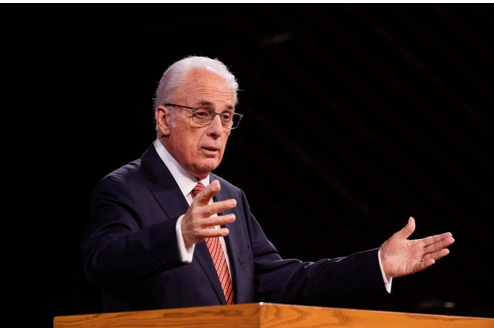Student Loan Forgiveness: Considerations for Conservative Christians
By: Truth + Fire Topic: Current EventsThe day the Biden Administration announced its Student Loan Debt Plan, my best friend sent me a text.
“Thoughts?”, it read.
It accompanied an infographic detailing who qualifies for student loan forgiveness and the maximum amount to be forgiven per borrower under the Plan.
My immediate response was, “It ain’t enough,” along with a laugh out loud emoji.
I then went on to express that if this plan would tank the American economy, “I don’t want it.” “For me, if they could just waive the interest, I’d be grateful,” I added.
“I’m glad I went ahead and paid off my loans, with the help of [my husband] of course,” my best friend replied. “I wouldn’t qualify for this program anyway.”
My best friend, a mechanical engineer, paid off her student loans a few years back thanks to an aggressive repayment plan she and her husband, also a mechanical engineer, devised. I saw the sacrifices they made and was there to witness God lovingly “interrupting” their plan along the way with the birth of their children. But, eventually, she would taste the gloriousness that is freedom from student loan debt, and I have continued to praise the Lord on her behalf for that!
My scenario hasn’t been quite the same, but I’ve been nonetheless on my own plight to rid myself of student loan debt. While I received a full, merit scholarship for my undergraduate studies, I financed my graduate studies with a blend of partial scholarships, employer tuition reimbursements and, of course, student loans. Yet, my career path was in the nonprofit/government sector, so I qualified for the Public Service Loan Forgiveness (PSLF) program. A bi-partisan policy implemented in 2007 under The Bush Administration, PSLF forgives the loan balance of qualifying public service employees after 120 monthly payments, or 10 years of consecutive monthly payments, whichever comes first. I left the public sector for a few years, so loan payments made during that time will not count towards the program’s requirement. Yet, I’m grateful that the PSLF program will still count all of my qualifying repayments made prior to my transition into the private sector and all payments made since my return to public service.
As I’ve reflected on my best friend’s and my own choices and experiences with student loans and the outrage coming from political conservatives over student loan forgiveness, I can honestly empathize with those who would benefit from the Biden Administration’s plan while also sympathizing with those who might not consider the program “fair”. So, to more thoroughly answer my best friend’s invitation to share my thoughts on the matter, I’ve done more thinking and some research that I might rightly explore this topic as a Christian and as an American citizen. I hope what follows offers something edifying and beneficial for the conservative Christian’s consideration, whether they have student loans or outright disagree with student loan forgiveness.
CHRISTIANS, STUDENT DEBT + FORGIVENESS

Before any of the political aspects of this matter flooded my timelines, one concern I saw many raise was whether it is okay for Christians to accept student loan debt forgiveness. In short, I’m certain the answer is “YES”. Of course, what an individual borrower decides to do is a matter of their conscience. But, I sincerely don’t see a conflict. As one who already qualifies for student loan forgiveness, I would be a hypocrite to judge anyone who wishes to take advantage of the Biden Administration’s plan. And when I consider the matter through Scripture, I also fail to find any moral or theological issues with Christians being willing to receive the relief.
While there are those who have ill motives in their application of God’s Word, and more specifically the Gospel, to the topic of student debt forgiveness, the truth is there is absolutely nothing unbiblical about one’s willingness to accept the forgiveness of this or any other form of debt. In fact, our very faith entails the tenet of humbling ourselves to receive grace and forgiveness – from God, through Christ, and men.
To be sure, one should avoid debt if he is able, as debt makes the borrower a slave to the lender (Proverbs 22:7). Many of us know full well how this bondage has felt over the years, so I’m sure no one needs to be convinced of this. But in this fallen world, the Lord recognizes that debt is sometimes necessary and has thus provided guiding principles in His Word that help us navigate the matter. Indeed, if we borrow, we are expected to repay our debts (Romans 13:7), as a wicked person borrows and, though he is able, does not repay (Psalm 37:21). Yet, God also makes provisions for when an otherwise willing borrower is unable to repay, and such cases tend to arise when the debt has ballooned due to interest or when the borrower falls into another form of financial hardship (Deuteronomy 23:19; Leviticus 25:35). In such cases, or after an appointed time, the Lord allows lenders to cancel debts (Deuteronomy 15:2; Leviticus 25:23-38).
Granted, I don’t know the personal circumstances of every American student loan borrower in terms of whether they need or “deserve” this relief. And I could totally understand the public’s outrage if the Biden Administration had proposed the forgiveness of debts owed to, and owned by, private lenders (more on this later). Yet, from what I understand of the Administration’s Student Debt Plan, those who stand to benefit are low- to moderate-income holders of loans owned by the Department of Education, the Lender. So, in this case, a need has been identified and since the Lender is willing to cancel its borrowers’ debts, Christian borrowers who qualify needn’t concern themselves with being “wicked” or “in sin” for accepting the pardon.
ON CHRISTIANS, STUDENT DEBT + FAIRNESS
Even as Christian borrowers of student loans who qualify for student loan forgiveness would be faultless for receiving this forgiveness, many who disagree with The Plan tend to lean politically conservative and a number of them are also professing Christians. To them, student loan forgiveness perverts justice because it’s not right that no other form of debt can be forgiven. But the truth is all debts except student loans have long benefitted from various mechanisms of dismissal. Mortgages, car loans, and credit card debt, for example, can be discharged in bankruptcy, charged off by creditors or collection activity on such can no longer be enforced after a certain period of time (usually seven years). Such laws have been on the books for centuries, and they derived from the Biblical principles on debt earlier discussed. Laws surrounding student loan debt dismissal only came into play around 2005, but the process is still much more challenging than ridding one of any other form of debt.
Opponents further claim that student loan forgiveness is wrong because it is showing partiality to the poor. Yet, they fail to consider how the Small Business Administration (SBA) is currently forgiving Paycheck Protection Program (PPP) loans and wealthier individuals and corporations have enjoyed government bailouts in the past (Google: 2008 Too Big To Fail Bush Administration).
They also don’t believe it’s fair to those who already paid off their debts or who decided to forgo college or make other life choices to avoid student loan debt. I actually agree with them on this point, especially concerning those who did borrow and have since repaid a federal debt. It isn’t fair that they also did not receive some relief if they would have benefited from it while their loans were in repayment. But I don’t know that the timing of when the program was announced necessarily makes its implementation wrong. Besides, if this were something conservative borrowers truly needed or desired, this might have been a policy point to advocate during the Trump Administration.
Looking further at this aspect of the matter through Scripture, I am reminded of the parable of the workers in the vineyard (Matthew 20:1-16). This parable ultimately teaches us that all who come to saving faith in Christ will inherit the same reward: eternal life. This wage is promised and guaranteed to each Believer no matter how soon or how late he comes to faith, how much he has labored for the kingdom or even how well he counts himself in God’s service. In the parable, the workers all agreed to a given wage for their work that day, but it wasn’t until those who were hired first realized that those who were hired later had received the same wage that they had an issue with the terms of their agreement. When they went to complain to the Landowner, He reminded them that they agreed to their wage and thus no unfairness had taken place on His part. “Don’t I have the right to do what I want with my own money? Or are you envious because I am generous?,” he told them. As we apply the practical principles of this lesson to student loan forgiveness, one might interject that federal student loans aren’t the government’s “own money” to forgive. One could reasonably disagree, however, as it was indeed the government who lent the funds. I’ll expound on my rationale for this more in the next section.
Another Biblical parable offering guiding principles on this matter is the one of the Prodigal Son. Again, the ultimate lesson here is spiritual and pertains to the Gospel. The Believer who remains faithful should never resent, but rejoice when a sinner repents. The Lord certainly does, and so do the angels in heaven (Luke 15:7-10). While I do pray any recipient of student loan forgiveness would repent and not return to student loan debt, this parable mostly comes to mind as it relates to the heart posture of the Elder Son. To his chagrin, the Prodigal Son received a party, a fine robe, a ring and a fatted calf after he returned home from squandering his inheritance. Yet the Father reminded His Elder Son that his blessing was the fact that he had remained with Him. The Elder Son had been safe in His Father’s house, enjoying His Father’s provisions. Meanwhile, his brother had experienced trial, lack and loss. Even as it was due to his own choices, a measure of compassion and joy for his return is the expected response of one who loves his brother.
So, whether a Christian student loan borrower stands to benefit from this program because of happenstance in timing or circumstance due to poor decision making, the Lord might be working providentially through this Plan to offer them a measure of grace.
As I shared the other day on Instagram:
“I hear the arguments about “fairness” and such, but if this is a way the Lord would work providentially in the lives of others, God bless them… You agreed to pay your funds back, you paid them back. Amen. Another agreed to pay his funds back and an opportunity to have them forgiven has come up. Amen…”
My point here isn’t to boast that some are getting something others won’t, but to glory in the Lord’s generosity in providing for those who need it or would in some way greatly benefit. It may have been nice for those who are already free of student loan debt to have received this aid – but by the grace of God, they don’t need it. As I discussed this with my best friend, she’s not concerned that others are getting something she isn’t. “I’m just grateful God made a way for me to pay mine off,” she told me. For her, His grace was at work in her life through a given means, and for others, this Plan may be a means of His grace in their lives.
Again, I already qualify for student loan forgiveness thanks to the “Bush Administration plan”, but even if I didn’t, as a Christian, I don’t know that I could have as much vitriol for fellow Believers or even other Americans, who would benefit from this offering from the Biden Administration. One can make presumptions about how one ended up in their situation, and I’ve seen many presume the worst in people. Yet if one understands that in this life trouble is guaranteed (John 16:33) and that even faithful, wealthy Job fell into financial ruin for a time (Job 1:13-17), one might consider that sometimes “life happens” for whatever purposes the Lord sees fit in one’s life. Yet His sun also shines on the just and the unjust as He wills (Matthew 5:45).
Even if opponents of this Plan don’t find its beneficiaries to be “deserving”, one has to ask themselves why they believe the grace of God working in anyone’s life is based on merit. Christians who are thinking this way may consider that we have every (unmerited) spiritual blessing in this life and eternal life in the next. Let these folks enjoy this tiny drop of kindness of the Lord’s providence and common grace. Who knows, for some, this may be the “riches of His goodness, forbearance, and long suffering” that leads them to repentance (Romans 2:4).
COUNTING THE COSTS

While I see no moral or theological issue with student loan debt forgiveness – the idea of it is great and I glory in the benefit it will bring those who qualify for it, I do have some political concerns about the Plan, however. If I must offer up a Biblical principle in objection to this policy, it would be “count the costs” (Luke 14:26-28). Spiritually, Christ is expressing one’s need to count the cost of following Him, noting that it requires our willingness to forsake all in this life to do it. If such a cost is too high, one is not worthy to follow Him. Practically applied, counting the cost requires one to consider all an endeavor will entail before they commence, for even if it be a good thing, it may prove to be too costly in the end. Student loan forgiveness may well be a good idea, but there is wisdom needed in ensuring it can be implemented, if it should be implemented at all. As such, how we’re paying for this initiative and if the investment is ultimately worth it are all fair public policy considerations.
As I’ve discussed this topic with my conservative friends, some of whom are also Christian, it seems they, too, are mainly frustrated with this program from a political perspective. Though, to gain more buy-in amongst conservatives and Christians, it feels like they’re grasping for Bible verses to make the idea, in itself, equate to the cost of being a sin.
First is the argument that student loan forgiveness is immoral because it would “force others” to pay for someone else’s debt. Indeed, Christ paid for our sins voluntarily, so we should never confuse this with any good one might do for others via coercion. Yet, we have to consider all of whom the “others” consist in this scenario before we outright conclude a moral deficit is at play.
The “others” of course, are American taxpayers. Yet, the last I checked, they not only consist of 1) American taxpayers who support student loan debt forgiveness (55% of American taxpayers), but also 2) federal student loan holders who have paid into the tax system over the years well more than the amount they stand to receive in student loan forgiveness.
For many conservatives discussing the matter, however, the “others” seem to be limited to themselves, individually. And, frankly, some of them have been unnecessarily harsh in their rhetoric as they speak on the matter. “I shouldn’t have to pay for someone else’s worthless degree?” or “Why should I be responsible for someone else’s poor life choices?” Yet, a federal student loan borrower who wishes to apply the same logic of personalizing the matter could argue, “I’m choosing to redirect $10,000 of my federal tax payments towards my student loans.” They could also point out the various government programs they help pay into, but for which they gain no personal benefit. For instance, I personally believe all Christian parents should homeschool their own children. Yet, many Christian parents have expressed that homeschooling isn’t financially feasible, so they’re keeping their children in public schools or publicly-funded charter schools for now. I respect their decision. I also continue to pay my federal and property taxes, which fund these schools, even as I have no children of my own. Of course, others have opted to send their children to private Christian schools. Amen. But let us not forget that even private Christian schools aren’t exempt from getting their own slice of the American (tax money) pie. Indeed it was PPP loans that helped keep some of these schools operational and able to pay their employees during the pandemic, and as I shared earlier, the federal government offers PPP loan forgiveness. Most of its borrowers, including Christian schools, Christian and/or conservative business owners and conservative politicians, took full advantage of this grace…with (forgiven) interest! Of the 11.5 million loans distributed as of July 2022, 10.2 million loans (totaling $742 billion) were fully or partially forgiven, and loan forgiveness applications continue to be accepted.
Second is the argument that forgiving student loan debt will inadvertently cause millions of Americans into sin because Scripture says, “The wicked borrows and does not repay” (Psalm 37:21). But again, if the Lender in this scenario is forgiving the debt, how is it wicked for the borrower to receive forgiveness? We were born indebted to the Lord…born condemned…born with His wrath abiding on us. Scripture says those condemned will perish. BUT, thanks be to God, there is also the Good News! There is more to this story, for “There is therefore now no condemnation to those who are in Christ Jesus, who walk not according to the flesh, but according to the Spirit” (Romans 8:1, emphasis mine). We have been redeemed from our former estate, when we were a slave to the flesh. We are now born again of the Holy Spirit, and we may now walk in this newness with joy and boldness! My point here is we have to tell the whole truth! While many of my conservative friends certainly mean well, they’re failing to share the complete picture, again, likely because they’re trying to make Scripture support their political view rather than allowing their views to be guided by Scripture. Indeed, the borrower is a slave to the lender, but not after the lender has set the borrower free!
As such, the only real concerns with this topic are political, and they are whether student loan forgiveness would drive up inflation, how much will it cost, and is the cost feasible?
According to Forbes, in theory, since student loan forgiveness would increase discretionary income among forgiven borrowers, this would drive economic activity. This, in turn, would drive demand and that would increase prices. However, the claim is the spike would be minimal, and barely noticeable at 0.1 to 0.5 percentage points, as only 31% of federal loan borrowers would see their loan balances completely forgiven. The Penn Wharton Budget model estimates student loan debt forgiveness will cost $469 billion to $519 billion over a 10-year budget window, depending on whether existing and new students are included in the loan forgiveness estimates. To put these estimates into perspective, consider that this cost will be spread out over a decade while the cost of the PPP loan forgiveness initiative, which only existed for a year, already outpaces student loan forgiveness cost projections by 43% to 58%!
With this in mind, I’m less willing to join the crowd in pretending student loan forgiveness will be the final nail in America’s economic coffin. I am also not at all willing to resent those who would benefit from it when there are many other programs already contributing to our current inflation rate, including those that don’t even benefit American citizens. The U.S. government is sending billions of dollars to other nations to cover their government’s budget gaps, but I’ve only seen conservatives yelp at this while they are growling about student loan forgiveness for fellow Americans. And somehow, some way, whether through federal or state funds, American taxpayers are covering the public education, medical expenses and social services for illegal immigrants. This point alone gives me even more of an audacity to celebrate a policy that actually concerns fellow citizens.
Now, if the projections change or some other ploy is at work where this Plan will crush Americans/tank the American economy, I would be happy to revisit this topic. But from what I’ve seen thus far, any Christian who wishes to take advantage of the Biden Student Debt Plan should feel free to do so.
I SAID ALL OF THIS TO SAY…
Those familiar with my content may believe I’m leaning more “liberal” on this matter, but I’ve long shared that I’m politically independent. I never claimed to fit neatly into a liberal or conservative mold politically. Instead, I do my best to view matters of faith and pop culture through the lens of Scripture. Where I find no definitive theological or moral issue, I am for Christian liberty. Politically, where I see no definitive theological or moral issue, I am for policies that make the most sense for those who would benefit and their ultimate impact on our nation.
So again, I find no fault with the federal student loan borrower who stands to receive a pardon from his Lender, which, according to his billing statement, is the Department of Education. But, for the conservative Christian who takes issue with this – for those who count themselves as the “Lender” and who say the pardon is immoral, unjust or a sin because they have not agreed to it, my requests to them would be the following:
- Consider that among the Americans who stand to benefit from this policy are your brothers and sisters in Christ. So if you wish to personalize this matter with yourself as “the Lender”, know that you are unjust in your dealings as you have placed a heavy burden on the backs of your brethren. If we would attempt to believe the best in our brothers and sisters, know that most, if not all, borrowed with good intentions to repay. Yet, many have become overwhelmed by the capitalized interest you are charging them that has caused their original loan amounts to double. I would request the Biden Administration to instead consider canceling student loan interest, or at least defer it until after the first 10 years of loan repayment. That would actually be a better indicator that his Administration is serious about student loan reform. Yet, many of you say that he has no authority in this matter. So, to those who count themselves followers of Christ, the next time you are tempted to argue how much this Plan “isn’t fair” to you and how you are the Lender, I hope that you would consider that Scripture says, “You shall not charge interest to your brother—interest on money or food or anything that is lent out at interest” (Deuteronomy 23:19). If this truly applies to you, I hope that you would repent.
- While economists are projecting only a minimal spike in inflation due to this plan, I can respect one’s concern about this matter. This is a public policy issue after all, so it is fair for every member of the public to know how the policy will work and how we’re going to pay for it. Yet, from a Biblical-perspective, this concern is also earthly! So, instead, we might look to the spiritual opportunities we have here. If this program would offer some financial relief to a brother who needs it, given that the cost would be minimal, the majority of Americans support it, and knowing that we are ALL already paying for matters that don’t even directly benefit us – let alone this nation, there is as much of a Biblical lesson here in bearing one another’s burdens as there is a lesson in not taking on debt in the first place. Granted, I’m not saying you have to or that you should pay for someone else’s life choices. I’m saying that you already are, and so is every other taxpayer, which includes student loan borrowers. So, what remains is to try to rejoice that another is enjoying a little providential grace through these means.
- Take rest in knowing that those who would abuse this Plan and those who are implementing it with impure motives already have their reward, and that God is still in control. We’re in a fallen world, so we should not be shocked at those who are still of it behaving as such. Rather than disparage and resent others for their individual, earthly life choices, might we remember that we’re called to witness to those who still stand condemned and remain unforgiven for their debt to God. As much as I can respect anyone’s concerns with this policy, the major gripe I’ve seen among conservative Christians hasn’t really been a legitimately Biblical one. This is all political. I have my thoughts this could be because of who is proposing The Plan, who originally advocated for The Plan or whom many conservatives presume would largely benefit from The Plan. I hold this view because government bailouts and student loan forgiveness are not new public policy ideas, Republicans have previously proposed and supported such, and conservatives have been largely mute on other such programs even as “American taxpayers are paying for it”. The outrage is inconsistent and out of proportion, so it might be necessary to consider one’s motives for disagreeing with this policy as much as one might question the motives of those who support it.
- Lastly, Jesus told his disciples that “the sons of this world are more shrewd in this generation than the sons of light” (Luke16:8), and I can see from this current debate exactly what He means. For even the dishonest steward understands how to use mammon to win friends in this life. They understand that money is a tool and a resource – a means to an end. I suspect this is exactly why the Biden Administration is making this political move, especially knowing that November is around the corner. And if conservative Christians continue to come against this policy fiercely and harshly without a solid Biblical basis and on an emotionally-charged political one, this certainly won’t help you find favor in their sight. So, instead of blocking this policy for no real reason other than what appears to be because Biden’s name is on it, just as liberals hate all things Trump for Trump’s sake, “make friends for yourselves by unrighteous mammon, that when you fail, they may receive you into an everlasting home” (Luke 16:9). Contrary to popular misapplications of Scripture, we Christians are ultimately “the least of these” in this life (Matthew 25:31-46). We will know persecution someday such that we won’t be able to boast in our own resources, or to complain about how we might be indirectly paying for someone else’s “life choices”. So consider this an opportunity to act shrewdly for godly purposes. Try to win those who might one day be in a position to take us in and give us a cup of cold water when the Biden Administration (or another with an antichrist spirit) doesn’t allow us to work because we refused to get the 18th booster shot or take the mark. (Just kidding! Not really.)
I’m not saying anyone has to agree with any of my thinking on this matter. But I pray the thoughts I’ve shared here provided a few valid Biblical and political points for reasonable consideration. I pray they contribute some perspective and inject a tiny bit of humanity and compassion into, what has so far been, a fairly hostile conversation. Whatever one’s objections, however, please be respectful in sharing them, and let’s remember that when we’re done debating, 1) student loan forgiveness is ultimately a “secondary issue”, 2) America is not our eternal home or hope, 3)Jesus is returning soon so let’s warn those in spiritual debt, and 4) all we have obtained in this life is rubbish and it is destined to burn up on the last day.





